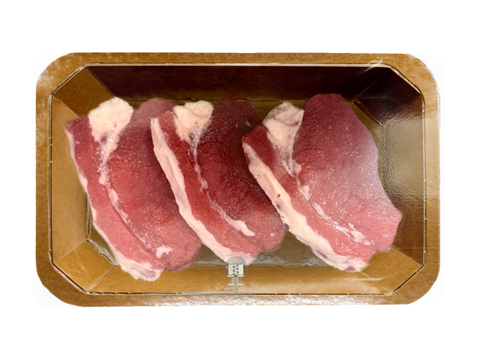
Solidus has combined its recyclable, fibre-based packaging with BlakBear’s wireless freshness sensors to monitor food spoilage, improve safety and shelf life, and combat waste.
Apparently, 5-10% of fresh food is wasted in grocery stores every day; the number is believed to rise in households. Much of this food is still thought to be safe to eat, but it is discarded due to ‘static’ and ‘conservative’ expiry dates.
Using miniature sensors inside food packaging, BlakBear’s technology measures gases released (e.g. ammonia) and temperature changes as food spoils – a process set to monitor freshness in real time. This approach is also expected to offer insights into microbiology and help companies forecast a product’s shelf life.
The data is transmitted via Bluetooth and RFID to be displayed on a web dashboard or API. Retailers and producers can use this knowledge to make decisions like rerouting shipments, optimizing cold chains, and avoiding unnecessary lab testing.
In turn, the partners intend to improve supply chain resilience, improve packaging performance and value, and boost the sustainability of food distribution systems.
“Traditional expiry dates are chosen to cover a worst-case scenario, based on simulated storage conditions,” says Max Grell, CEO of BlakBear. “Our sensors track actual biochemical changes, not time. That means shelf life becomes dynamic and based on reality, not assumptions.”
At the same time, Solidus hopes that its fibre-based packaging will tap into Europe’s high collection rate for fibre-based packaging, enable the use of recycled content, and help companies address their Scope 3 emissions.
Several of this year’s Sustainability Awards winners have set their sights on addressing food spoilage, including Avery Dennison with its Vidre+ smart label for fruits and vegetables. This solution is set to extend a product’s shelf life by days or weeks, depending on the product, by gradually releasing the synthetic plant growth regulator 1-MCP and slowing the ripening process.
Elsewhere, StePacPPC and Windham Packaging have developed a range of bulk modified-atmosphere packaging expected to improve the shelf life of fresh produce heading to foodservice outlets. It is said to be resealable and features inbuilt water vapour transmission rates to cut down on moisture buildup and avoid premature spoilage.
Another solution saw Makro and VML apply stickers to fresh produce with visual indicators of the product’s ripeness, providing serving suggestions for each stage. This approach is also hoped to tackle unnecessary food waste.
If you liked this story, you might also enjoy:
The ultimate guide to the Packaging and Packaging Waste Regulation in 2025
How are the top brands progressing on packaging sustainability?
Everything you need to know about global packaging sustainability regulation in 2025
The key to increasing the use of reusable packaging in supermarkets














No comments yet